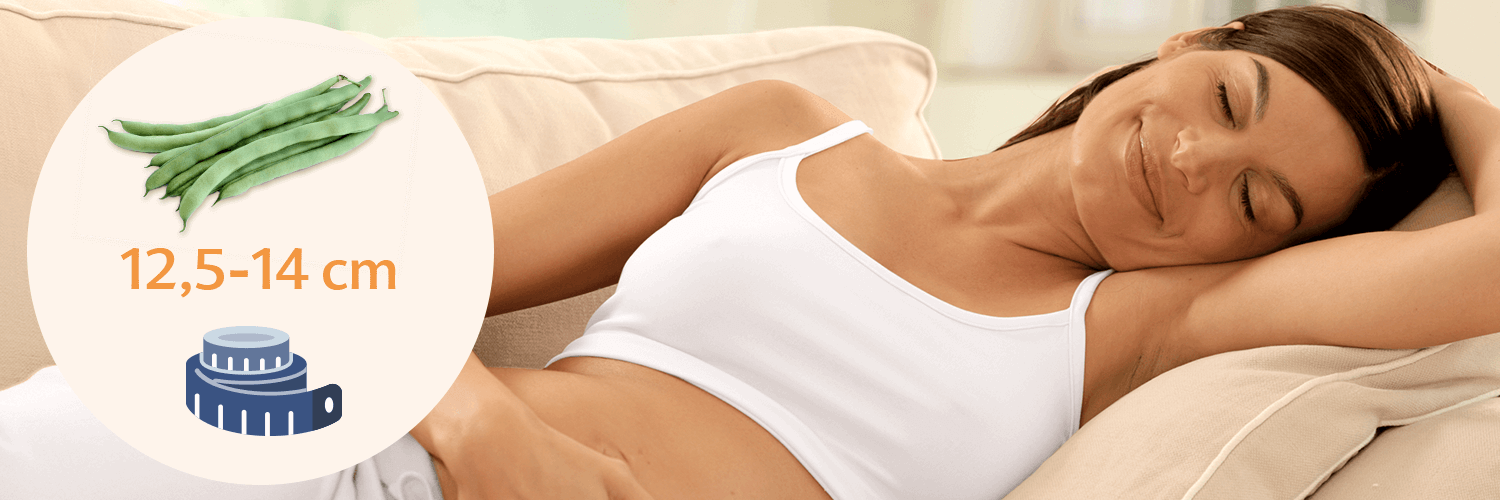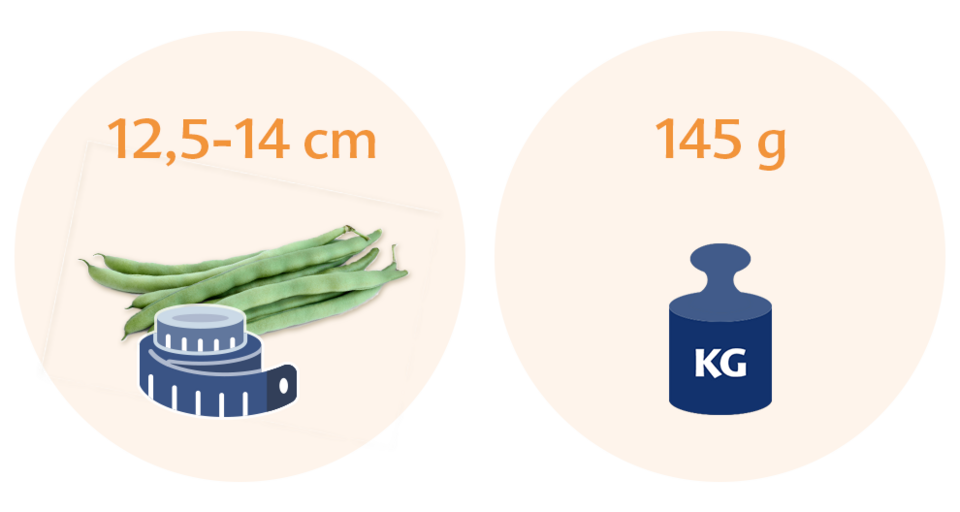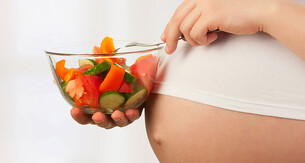Size of your baby in week 18
Your baby will be between 12.5 and 14 cm in size, so about as large as a runner bean. This makes them exactly the same size as the placenta that supplies them with everything they need. They’ll weigh around 145 grams, and now their development really accelerates as they need to get a lot bigger and put on a lot of weight before the birth.
Both the placenta and the umbilical cord have adapted so that they can meet your baby’s increased need for nutrients during this phase of rapid growth in week 18. The umbilical cord is now longer, thicker and more robust, which is important to ensure an increased blood flow and to withstand your baby playing with it and using it to practise gripping – think of it as their first and favourite toy, given to them before they’re even born.
Your baby’s development
In week 18, your baby’s body is getting closer and closer to the proportions they’ll have at birth. Their limbs (arms and legs) are now growing extremely quickly, and the first hairs are forming on their head.
Your baby’s blood flows through the umbilical cord to the placenta, where it is enriched with the oxygen and nutrients they need before returning to their body back through the umbilical cord. Although you and your baby’s bloodstreams are closely interlinked, they won’t actually mix. This is because the placenta acts as a barrier or filter, protecting your baby from the influence of harmful substances.
From week 18, you’ll be able to see your baby’s little heart beating in an ultrasound scan and your doctor can test for any defects. If you or a family member have heart problems and you’re unsure, speak to your doctor or midwife about it.
What it’s like for the mum-to-be in week 18
In week 18, you’ll be full of beans. You’ll want to create a safe and comfortable home for your future family, and your creative juices will be flowing.
Even though you’re making all these plans and acting on them, however, don’t overdo it – there’s still plenty of time before the baby comes.
You should now avoid lifting heavy objects, e.g. baby furniture, and shouldn’t be on your feet for too long at a time. One thing you can do to avoid spider veins (varicose veins) and help your legs is take sufficient breaks and sit or lie down with your legs in a raised position.
Something else you might have noticed is that your centre of gravity has shifted as your bump has grown. So practise keeping your balance by alternating between putting your weight on one foot and then on the other when you’re standing up.
If this is your second child, you’ll be lucky enough to feel them moving already, and over the next few weeks you can expect to feel their movements even more strongly. If this is your first child, you’ll probably have to wait a bit longer.
Common signs and symptoms
Unreliable blood pressure
You may feel dizzy every now and then. This is because your body is having to work very hard and is transporting more blood around your body through your blood vessels. Your blood pressure is currently a bit lower than normal and may drop rapidly for a few moments if you’re doing something strenuous, which can make you feel faint. If this happens, sit or lie down with your legs in a raised position. It won’t take long for your body to adjust, and you’ll soon feel better.
Your doctor or midwife can test regularly to see if your blood pressure is consistently too low. In almost all cases, low blood pressure can be resolved with conservative therapy to suit the rhythms of everyday life during your pregnancy. Vein training, which involves tensing and relaxing your leg muscles, can also help with low blood pressure and varicose veins.
Midwife’s advice
A small amount of caffeine or theine can be good for you. You can drink two cups of coffee or black/green tea a day without feeling guilty.’ Dorothee Kutz, midwife
When your stomach rebels
Your stomach produces and secretes larger quantities of gastric acid during pregnancy, which can often cause heartburn. If this happens to you, try to sit up straight and slow down a little when eating, and avoid acidic food as much as possible. Two ways to ease heartburn are to chew bread or almonds and to increase the amount of potato products and oats you eat (oats are best consumed when cooked, e.g. as porridge).
You frequently feel tired
It’s completely normal to feel tired more often (there’s a lot going on inside you, after all), as during pregnancy you need lots of trace minerals which you might not always get. Therefore, we recommend that you increase your iron intake, as iron binds the oxygen in your blood and helps both you and your baby get the oxygen you need. Focus on eating meals and drinking juices that contain high amounts of iron, such as a mild juice with red fruits.
Your body feels different
As you excitedly watch your growing baby bump, you’ll notice that your body is beginning to feel different. Walking will become more of an effort, your legs will feel heavier and you’ll need more breaks than before – this is completely normal.
You might also find it harder to get to sleep if you normally sleep on your back, because your belly will be pressing down on your organs and blood vessels. A breastfeeding pillow (if you’ve already got one) can help you sleep comfortably on your side if you put it between your legs.
Top tips
- A breastfeeding pillow can help you sleep better.
- Iron-rich foods are recommended.
- It’s good to raise your legs every now and then and to take breaks when walking.
- Daily vein training exercises will help.
- Wearing flat shoes will make walking easier.
- You can start buying the first things you’ll need for your baby. Check out our tips for setting up a baby changing table.
Questions you may want to ask your doctor or midwife
Vein strengthening exercises
Your midwife can show you exercises specifically designed to strengthen your veins, train your blood circulation and prevent varicose veins. This is particularly important if members of your family suffer from varicose veins. There are special creams you can rub into your skin to help, which you can find in your local chemist’s or pharmacy.
Preparing for the birth
Ask your midwife about antenatal classes.
You should sign up by week 20 of your pregnancy, and you can usually start them when your third trimester begins (around week 28). As well as finding out what happens when you give birth, you’ll pick up some useful tips to help you prepare for it. Your partner or a close friend is welcome to come along to certain classes, so that they know how they can support you before and during the birth.
Stabilising your blood pressure
Your doctor can recommend ways to keep your blood pressure stable.
One exercise you can do is to make bicycle movements with your legs in bed before you get up in the morning, which will boost your circulation.
Information about the author:
Juliane Jacke-Gerlitz is a registered nurse. She has been working in the field of mother and breastfeeding counselling for more than ten years. Currently she is working as a medical writer and psychological consultant. Juliane Jacke-Gerlitz has been married for 22 years, is a mother of eight children and lives with her family in Halle.
This could also interest you:






